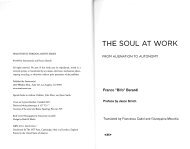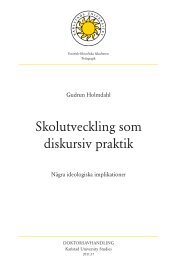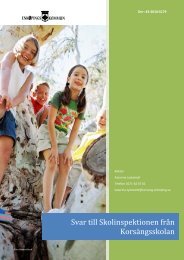FULLTEXT01
FULLTEXT01
FULLTEXT01
Create successful ePaper yourself
Turn your PDF publications into a flip-book with our unique Google optimized e-Paper software.
produces performances, which have contributed to the construction of a<br />
particular school (Säfström, 2001).<br />
So-called „situated knowledge‟ and experience of school reforms and dilemmas<br />
related to such reforms seem to be ascribed importance in some of the<br />
consensus-like logic that makes „school development‟ to its focus. Several<br />
longitudinal, school development- and research projects seem to be designed as<br />
sorts of procedurally oriented models implemented on school‟s conditions with<br />
elements of action research. Nevertheless, Svedlin (2003) argues that such<br />
models are not neutral and therefore one should also analyze how the<br />
implementation unfolds and how certain elements are excluded in connection<br />
with such an evaluation, or how the understanding about such aspects is.<br />
I pay special attention to two theses, Schantz Lundgren´s (2008) and Åstrand´s<br />
(2009), whose respective departure points are a type of collaborative projects<br />
with several similarities with the project that I myself participated in; that is to<br />
say what Lendahls Rosendahl and Rönnerman (2002) call „projects ... where<br />
collaboration between academics and practitioners is being tested‟(p.71, own<br />
translation). What Schantz Lundgren (2008) among other things does in her<br />
thesis is that she declares it (in addition to being a critical review of „the scope<br />
for action model‟) for being a critical examination of her own actions in<br />
connection with the project in question. She also states that she wants to focus<br />
on „problems with reformal change in schools‟ (p.19, own translation) in a more<br />
general sense. To some extent the latter may be associated to what Säfström<br />
(2001) states about the scientific „language game‟ and education-policy-<br />
„language game‟ as integrated into each other. When I read Åstrand's (2009)<br />
thesis I made a partially similar but yet somewhat different reflection. Under the<br />
PBS 146 , which was somehow focus for the project that Åstrand (2009) attended,<br />
experience is considered as something essential, while Åstrand on the other hand<br />
in her thesis makes stories about experiences of PBS to something significant in<br />
itself. Thus Åstrand contributes to a clear shift in perspective in relation not<br />
only to PBS, but also in relation to what can be considered as a consensus-like<br />
logic connected to „school development‟. In that respect, but also with<br />
reference to the post-modernly oriented design in Åstrand´s thesis, one might<br />
speak of a kind of relationship between her approach and mine.<br />
146 Problem Based School development (Scherp, 2003)<br />
177






